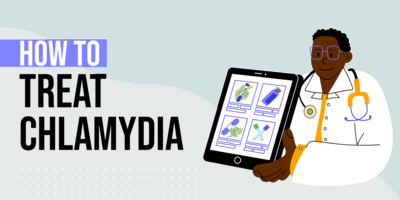
How to Treat Chlamydia
Chlamydia is a bacterial infection that is spread by sexual contact, according to the CDC. It is one of the most...
Read moreHelp patients book appointments with you on Solv. It's free!
2 instant-book locations

No more surprise bills. Solv is committed to making getting healthcare as easy as buying groceries at the store, including knowing the price of care upfront.

Help patients book appointments with you on Solv. It's free!
According to the CDC, everyone between the ages of 13 and 64 should get tested for HIV at least once as part of routine health care. However, those who engage in risky behaviors such as unprotected sex, sharing needles, or having multiple partners should get tested more frequently. It's important to remember that HIV can affect anyone, regardless of age, gender, race, or sexual orientation.
Early detection of HIV is crucial for managing the virus and preventing its progression into AIDS. It also helps prevent the spread of the virus to others. According to the CDC, 1 in 7 people in the United States who have HIV do not know they have it. Therefore, regular testing is vital to identify and treat the virus early, which can lead to a normal and healthy life.
Urgent care and walk-in clinics offer convenient and quick HIV testing services. Med-X Urgent Care and Canyon View Urgent Care in Grand Junction, CO, are two such facilities where you can book same-day and next-day testing appointments through Solv’s website and mobile app.
Your primary care provider can also conduct an HIV test during a regular check-up. If they do not offer HIV testing, they can refer you to a place that does.
Community health centers like Community Care of the Grand Valley in Grand Junction, CO, offer free or low-cost HIV testing. These centers are particularly beneficial for those without insurance or with limited financial resources.
At-home testing kits provide a convenient and private option for HIV testing. These kits can be purchased online or at a local pharmacy and allow you to take the test at your own convenience.
While specific data for Grand Junction is not readily available, according to the Colorado Department of Public Health and Environment, there were 14,271 people living with HIV in Colorado at the end of 2019. It's crucial for residents of Grand Junction and nearby cities like Orchard Mesa, Clifton, Redlands, Palisade, and Fruita to get tested regularly to know their status and prevent the spread of the virus.
Risk factors for HIV in Grand Junction are similar to those in other parts of the country. These include unprotected sex, sharing needles for drug use, and having multiple sexual partners. It's important to understand these risks and take necessary precautions to protect yourself and others.
HIV is not the only sexually transmitted disease that residents of Grand Junction should be concerned about. Other common STDs include gonorrhea, chlamydia, syphilis, and hepatitis. Regular testing for all STDs is recommended, especially for those in high-risk groups. Testing locations like Med-X Urgent Care, Canyon View Urgent Care, and Community Care of the Grand Valley offer testing for these STDs as well.
Solv has strict sourcing guidelines and relies on peer-reviewed studies, academic research institutions, and medical associations. We avoid using tertiary references.
Everyone between the ages of 13 and 64 should take an HIV test at least once in their lives. Some people are more likely to get HIV and should be tested more regularly. Those who have had sex with an HIV-positive partner, those who inject drugs, sexually active gay men, and those who have unprotected sex are all included. You should get checked every 6-12 months if you have any of these risk factors.
Antibodies created by your body in reaction to the virus are examined in HIV tests. A blood test or a sample of cells obtained from the inside of the cheek can be used to do this. After that, the sample is transported to a lab, where a technician will look for antibodies.
It can take a long time for your body to build enough antibodies for an HIV test to detect the illness if you become sick. It may take 3-12 weeks for your blood to contain adequate antibodies. Even if you have HIV, you could have a negative test result during this time.
Because the sample must be sent to a laboratory for investigation, most HIV test results might take anywhere from a few days to several weeks. On the other hand, some Grand Junction clinics or doctor's offices may offer rapid HIV testing, which can deliver a diagnosis in as little as 20 minutes. Rapid HIV testing involve a little sample of blood or fluid obtained from the mouth. You'll need a follow-up blood test to confirm the diagnosis if a fast test comes up positive.
A variety of factors influence the cost of an HIV test, including the type of test you receive, the location where you are tested, and whether or not you have health insurance. HIV testing may be provided for free or at a low cost by some clinics or health authorities. If you're a college student, you might be able to get free HIV tests through your school.
The majority of insurance coverage cover HIV testing. The Affordable Care Act mandates that all new health plans provide free HIV testing for those aged 15 to 65. If you have any doubts about what is covered under your individual health plan, you can always call your insurance company or go to their website.
Many Grand Junction health clinics, doctor's offices, and the health department offer HIV testing. Some pharmacies with on-site clinics may also be able to give HIV testing. Even though some clinics accept walk-in appointments, making an appointment ahead of time will save you time and ensure that you receive your test on the same day.
Yes, Solv offers same-day and next-day HIV testing appointments. We collaborate with thousands of healthcare providers across the country to make it easier for everyone to access the medical assistance they require quickly and conveniently. On our website, you can choose a physician near you and make an appointment right now.
Simply type "HIV test" and your location into our website's search box. You'll find a list of providers and their available appointment times on the next page. Fill out the form to arrange an appointment at a time and location that is convenient for you. Make certain that your appointment is for "HIV testing."
Although there are several home HIV tests available, not all of them are accurate or FDA-approved. For a home test, you'll need a swab from the inside of your mouth or a blood sample taken with a finger pricker. If you get a positive result on a home HIV test, you should see a doctor to confirm the diagnosis and start treatment.
Annual Wellness Exam in Grand Junction
Chickenpox Vaccine in Grand Junction
DOT Exam in Grand Junction
Ear Wax Removal in Grand Junction
Eye Exam in Grand Junction
Flu Shot in Grand Junction
Hepatitis Vaccine in Grand Junction
Measles Vaccine (MMR) in Grand Junction
Pap Smear in Grand Junction
Physical Exam in Grand Junction
Shingles Vaccine in Grand Junction
Sinus Infection Treatment in Grand Junction
Sports Physicals in Grand Junction
Tetanus Shot in Grand Junction
Typhoid Vaccine in Grand Junction
Well-Woman Exam in Grand Junction
Yellow Fever Vaccine in Grand Junction
A1C Test in Grand Junction
CMP Test in Grand Junction
Chlamydia Test in Grand Junction
Diabetes Test in Grand Junction
Gonorrhea test in Grand Junction
H Pylori Test in Grand Junction
HIV Test in Grand Junction
Hepatitis test in Grand Junction
Herpes Test in Grand Junction
Mono Test in Grand Junction
Pregnancy Test in Grand Junction
STD Testing in Grand Junction
Strep Test in Grand Junction
Syphilis test in Grand Junction
TB Test in Grand Junction
Thyroid Test in Grand Junction
Trichomonas Test in Grand Junction
Vitamin D Test in Grand Junction
Tips, advice, news—your resource to stay healthy and safe while improving your experience with healthcare providers when you need them.